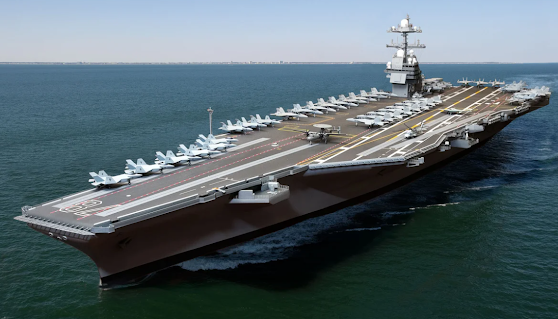However the new warship has not been
without problems which has resulted in
numerous delays. It has a toilet system that is prone to
clogging leaving some male sailors to
resort to using bottles to answer
nature's call, while many female sailors
simply held it and developed health
problems as a result.
Unclogging the system cost upwards of
four hundred thousand dollars, but the
toilets were just one of the more
serious issues. Those issues include the aircraft
carriers 11 advanced elevators used to
move missiles and bombs from the weapon
magazines up to the flight deck to then
be loaded onto aircraft.
All of the elevators utilize new
technology that includes high-powered
magnets, instead of cables to move the
heavy ordnance and all were supposed to
be in working order when the ship was
delivered to the navy in may 2017, but
that was far from the case, none were actually operational.
By last summer the navy had been able to
get six elevators working and said that
all would be in service when the ship
was set to begin its FSST tests. Again, that didn't work out as planned
and as of last week's final shock trials, four of the elevators were still not
installed.
The lifts must be in full operational
working order before gerald r ford can
head out on its maiden deployment next
year. Last month the Chief of Naval Operations (CNO) admiral Mike Gilday provided an
update on the state of the advanced
weapons elevators and said that lessons
were learned from the process. Those lessons will be applied to new or
shipped classes including the
constellation class frigates.
One is that when you lock in the design
you lock in the design, Gilda said during
a pre-taped virtual session ahead of the
navy league sea air space exposition in
early august.
And so when we start building the
frigate, we are not looking at adding any
new systems to that ship. the delivery of the frigate needs to be
the navy spacex. Gilday added, it needs to
come out right on time within its budget
and with everything working right.
The CNO also noted that the navy had
learned the importance of land-based
testing on new systems before
introducing them to the fleet and that
the service's choice to introduce a
total of 23 new technologies onto the
carrier was too ambitious. It resulted in scheduling delays and
cost overruns, which in turn led to
negative media coverage and even
congressional hearings.
The ammunition elevators are an
exceptional example of a painful process
over the past four or five years, said Gilday, and so we are in the in the 21 budget we
already have money dedicated to
land-based test sites for the frigates
so that we can perfect the technology
before we before we deliver it to the
ship.



